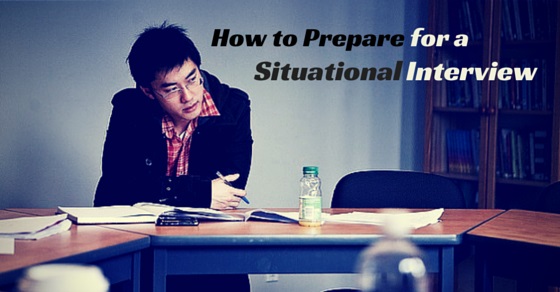Getting ready for an interview, for sure takes up time and energy. In the meanwhile, preparing for an interview, one would need to know the type of interview, which they would have to attend. Standing apart from the regular interview, there are other types of interviews such as behavioral interviews, structured interviews or situational interviews, as well. This article here, however, addresses some of the job interview tips on how to prepare for a situational interview.
 Tips to Prepare for Situational Interview:
Tips to Prepare for Situational Interview:
What is Situational Interview:
- The job interview techniques, where the candidate is in a problematic situation or rather in a situation wrought with conflict, thus going on to assess the situation and arrive at a decision based on it is called the situational interviews.
- Totally diverse from regular interviewing, the situational interview does not in any way deal with questions like one’s experiences or even emotional questions like co-workers opinion on the candidate.
- The questions asked in situational interviews are more often than not used by the employer to review an applicant’s capability if faced with conflict and to see how they measure up with the requirements of the job profile, as is specified in the posting.
- For the time being, separate from the other clichés of questions, by and large asked at the other interviews, the questions at the situational interviews are more specific and cites examples from work experience or studies over the year as the basis for claims by the candidate that one is proficient or qualified enough to suit the specified job profile.
- Consequently, if a candidate has to know how to prepare for a situational interview, one would have to read up on the important features that stick out such as multitasking, time management or autonomy and much more. The applicant would also need to provide clear-cut examples as a way to support one’s claim on certain skills or characteristics.
Example questions asked at Situational Interviews:
- One thing that makes it stand apart is the type of hypothetical questions often asked at the situational interviews. These are more questions based on hypothetical situations, to see how the candidate would react, if confronted with a particular situation. Let us take a look at some of the sample questions, here.
- A number of of the questions asked for situational interviews to put across as examples here are inclusive of questions on the subject of some challenging work questions. They would also address questions such as how an applicant would handle the situation or could go on to address issues about some quick thinking an applicant might have done to arrive at some conclusion. One could also talk about a conflict with a colleague.
- Other questions asked in interview covers situations where the candidate used an out of the box approach, or where one chooses to follow a different path from the boss’s suggestion and how the applicant approached the issue at hand. One is also asked about circumstances where one might have to give examples of when one motivated someone. Answering these questions promptly with proper examples to support the claim means the person has thus learned how to prepare for a situational Interview.
Preparing for the Situational Interview:
- Once the candidate is aware of the fact that one has to attend a situational interview, preparing for it turns out easier than expected. What one needs to do is to study all the situational questions. To give out most fitting and appropriate answers for the questions at the situational interview, the candidate would need to review their experiences at work or even while at studies.
- Following this, the candidate could then go out to see what would go best as an example to support the applicant’s claim of some qualification or skill most relevant to the job profile. One would need to be very specific and precise with the answers. Always take care to ensure that the answers given for the questions at the situational interview are very positive.
- The applicant would also have to avoid swearing at all costs. At the same time, make sure to never disparage one’s previous or present boss or manager. Always, make sure to list out one’s achievements and success stories all throughout their career or professional life so as to use them as examples if ever required.
Tips to answer Situational Interview Questions:
One thing to think about is that more often than not, questions asked at situational interviews are time and again based on a hypothetical situation, in which the employer tries to review the capabilities and skills of the candidate as well as to see, how one would fare in certain circumstance, in case need arises from the answers they give to the questions asked.
Learn about the job profile:
The main thing to consider is that in order to know how to prepare for a situational interview, the candidate would need to research or read up the job profile, its requirements and so on. This definitely helps one to understand the profile and the questions that are gonna be asked, so that one can prepare ahead for the interview process.
Make a list of events:
One thing that a candidate has to do while preparing ahead for the situational interview is to list out the achievements or success stories over time, so that one can cite them as an example to support the claim that they posses the skills or qualifications, which could make them a perfect fit for the job posting already mentioned.
Cite the examples:
Often asked question in situational interviews is circumstances of when or how a applicant handled a difficult situation or how the candidate solved the problem. To support the claim by the applicant, one would need to list out certain examples or short stories where the candidate contributed to solving the problem. It helps if the candidate has a better understanding of the problem, and how one solved it.
What employers want to know about Candidate:
Prior to appointing anyone, what any employers wish to know about an employee is how perfect a fit one is within the company as well how one would act in response to change and conflicts that arise. They also wish to know how any candidate deals with strain or disappointment. They would also like to know If any applicant has the skill as is required or mentioned at the job profile .
Instruction to follow:
One would need to list out the number of events, achievements or success stories, so as to use them at a later date at whatever time it would be required. Then, go on to talk about how one filled time or even how would one react in hypothetical conflict. One should also go on and cite examples as a basis for one’s claim of skills or capabilities.
Three step process:
Always answer the questions with personal examples of how a person reacted when in particular situations. The explanation for the three step process given below is an example of how to prepare for a situational interview.
As part of the three way process, the candidate would need to identify the problem/circumstance or issue, at hand. Then the candidate would need to see how one would react to any particular situation or how they solved the issue, properly. Finally, as a conclusion to the three step process the candidate would also have to see the consequences of the effort.
Candidate skills evaluated at Situational Interview:
In the meantime, some of the skills addressed at the situational interviews include people skills or ability of the candidate to handle thorny colleagues, clients or customers at work. It also evaluates the applicant’s ability to sort out the employees, more than ever in tandem with working on time limit.
At the same time, other skills or capabilities covered by the successful interview also covers communication or persuasion skills. The problem solving ability of the candidate is also to be addressed, via the questions asked at the situational interviews.
How to answer Situational Interview questions:
Now, before addressing the situational based interview questions, the candidate needs to understand certain things, so that one can come up with the most appropriate answer for the job interview questions asked at the situational interview. Assess the questions properly before answering.
Begin by understanding why the recruiter is asking a specific question, even as the employer also needs to evaluate the type of skills or qualifications of the candidate most suitable for the job profile. Then the applicant would also have to apply with definite examples rather than some ambiguous or vague diplomatic answers.
Why Some Companies opt for Situational Interview:
Resumes, ofcourse form an important part of the job hunt. However, even if the candidate goes on to list out the achievements or success stories in their resumes, they can in no way convey the competence of a candidate, which make them a perfect fit for the role or responsibility mentioned. The interview, in turn goes on to help the employer to evaluate how a candidate would respond when in a hypothetical situation.










































